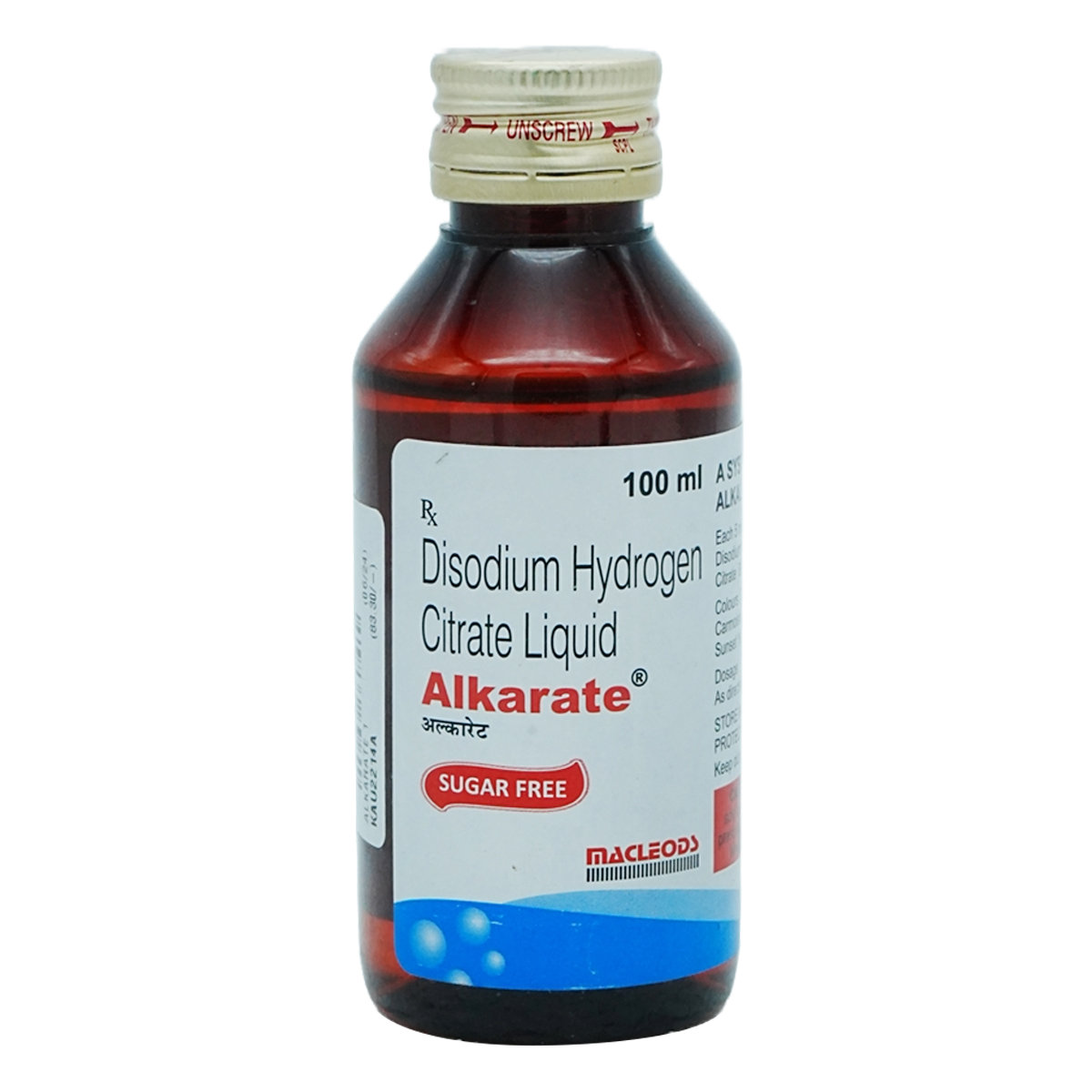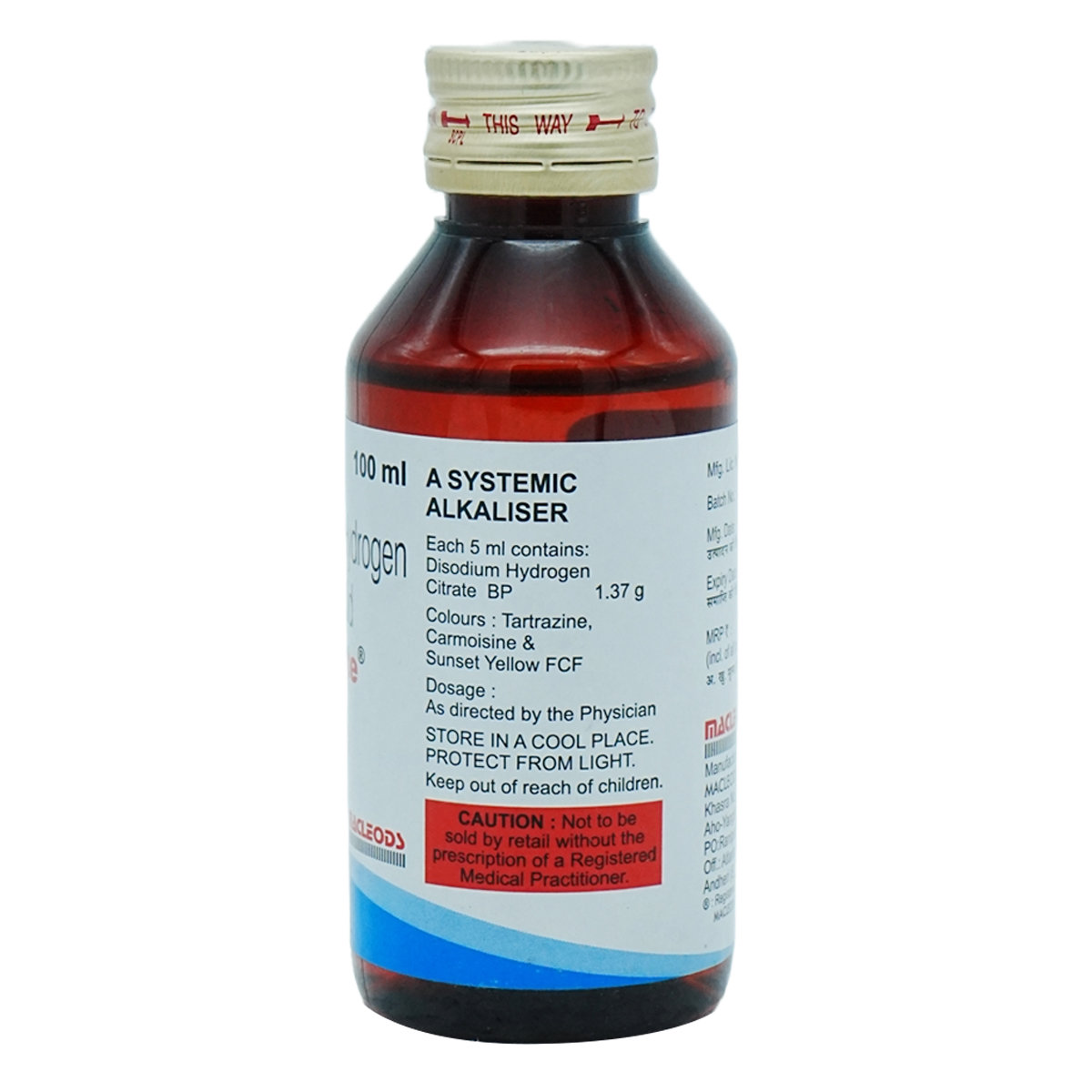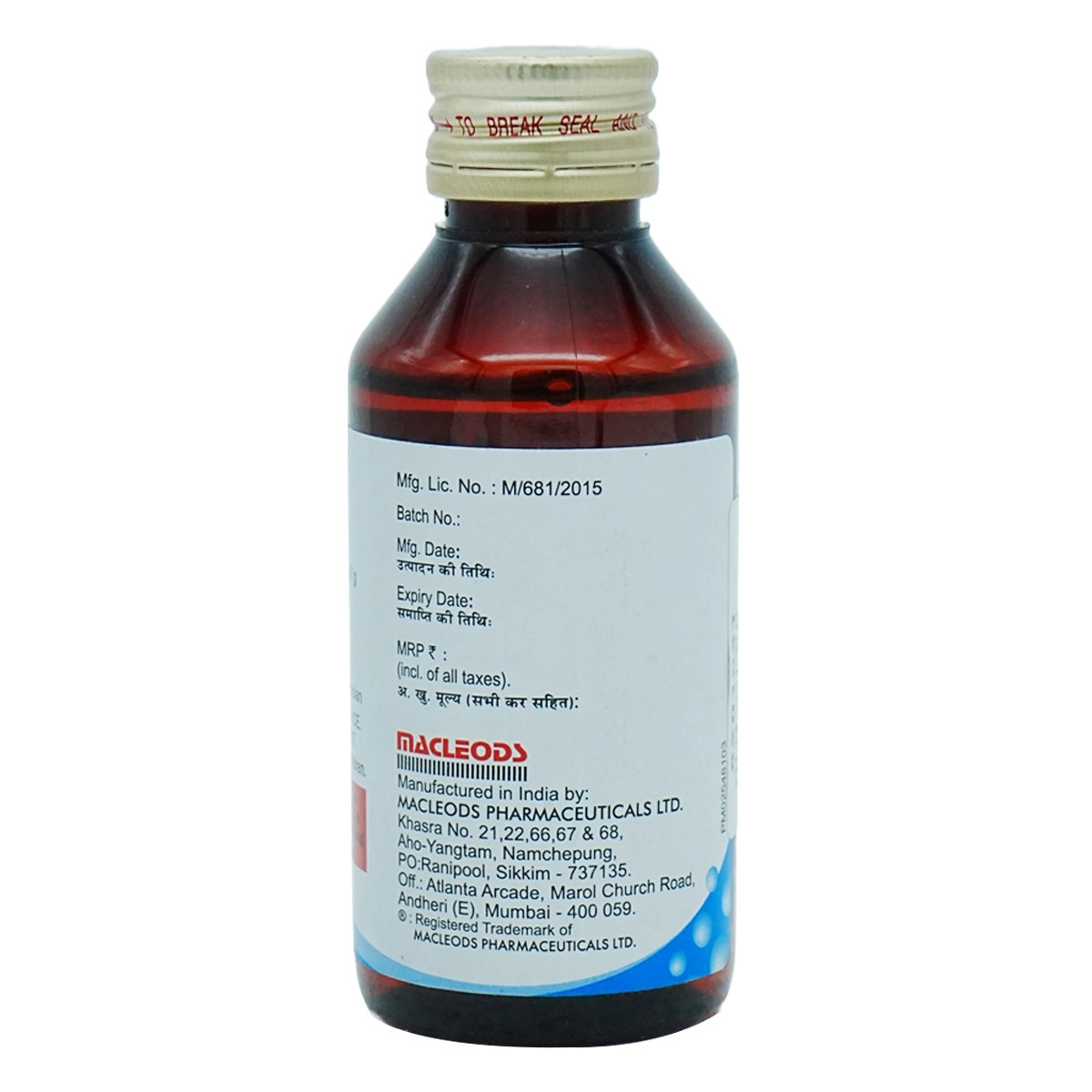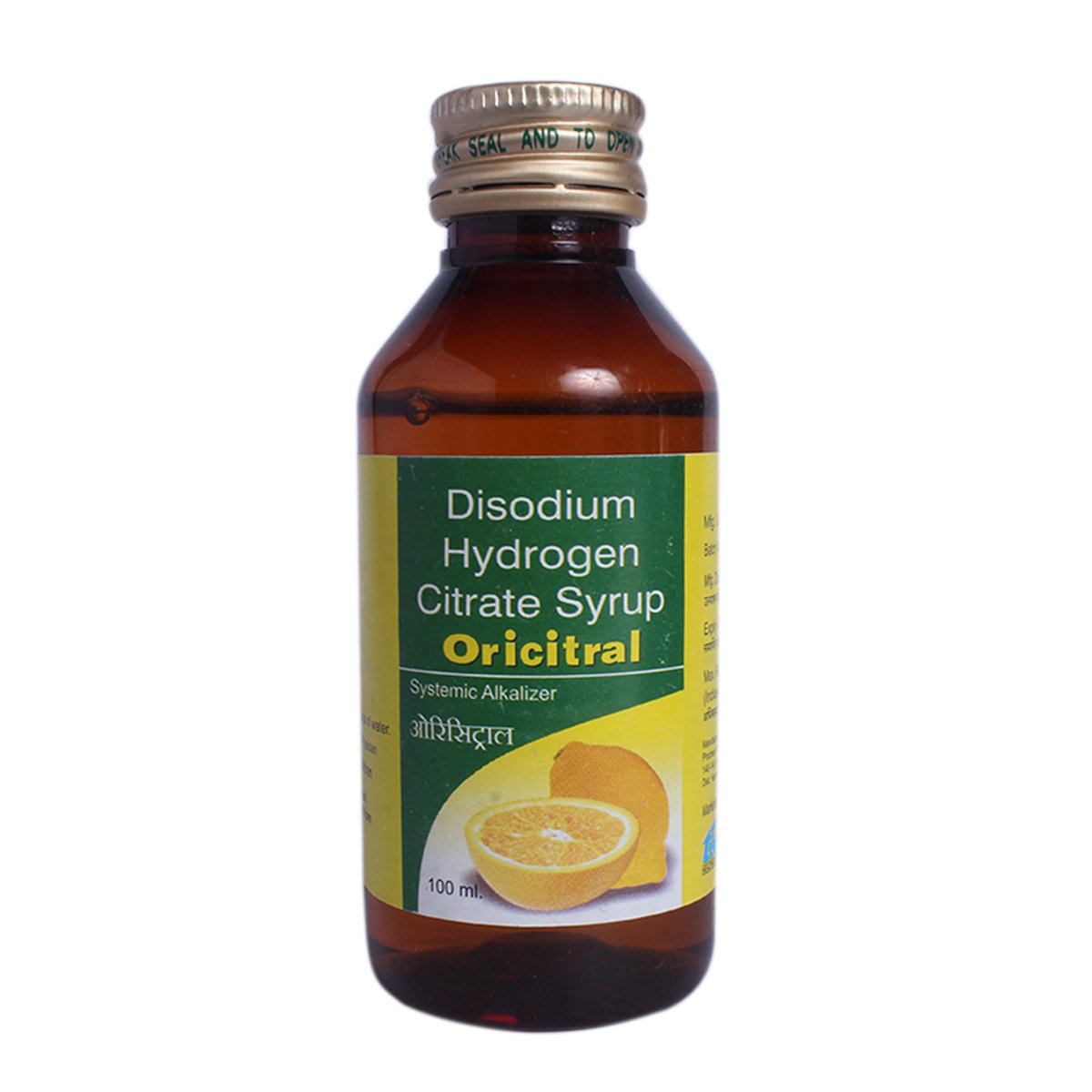Alkarate Syrup 100 ml
MRP ₹93.5
(Inclusive of all Taxes)
₹14.0 Cashback (15%)
Provide Delivery Location
Online payment accepted
 Prescription drug
Prescription drugWhats That
Composition :
Manufacturer/Marketer :
Consume Type :
Expires on or after :
Return Policy :
About Alkarate Syrup
Alkarate Syrup is a urinary alkaliser indicated for the treatment of renal tubular acidosis, gout and kidney stones. Kidney stones are small, hard deposits made up of calcium, phosphate and other minerals/acid salts that stick together in concentrated urine. Renal tubular acidosis is a condition in which the kidneys fail to excrete acids into the urine; this causes the blood to remain too acidic.
Alkarate Syrup contains disodium hydrogen citrate, which metabolises to bicarbonate and increases the excretion of free bicarbonate ions; this increases the solubility of cysteine in the urine and ionises uric acid to soluble urate ion. This helps in increasing the urinary pH, thereby makes the urine less acidic.
You are advised to take Alkarate Syrup for as long as your doctor has suggested it for you, depending on your medical condition. In some cases, you may experience certain common side effects, such as abdominal discomfort, diarrhoea, tiredness, nausea, and vomiting. Most of these side effects do not require medical attention and will resolve gradually over time. However, you are advised to talk to your doctor if you experience these side effects persistently.
Consult your doctor before taking Alkarate Syrup if you are pregnant or breastfeeding. Avoid alcohol consumption while taking Alkarate Syrup . It is not known if Alkarate Syrup affects your ability to drive; drive only if you are alert. Talk to a doctor before giving Alkarate Syrup to children. Keep your doctor informed about your health condition and medicines to rule out any side effects.
Uses of Alkarate Syrup
Directions for Use
Key Benefits
Alkarate Syrup is a urinary alkaliser indicated for the treatment of renal tubular acidosis, gout and kidney stones. Alkarate Syrup contains disodium hydrogen citrate, which metabolises to bicarbonate and increases the excretion of free bicarbonate ions; this increases the solubility of cysteine in the urine and ionises uric acid to soluble urate ion. This helps in increasing the urinary pH, thereby makes the urine less acidic. Alkarate Syrup may also help to treat urinary tract infections.
Storage
Drug Warnings
Do not take Alkarate Syrup if you are allergic to any of its contents. Inform your doctor if you have hyperkalaemia (high levels of potassium), hypocalcaemia (low blood calcium levels), high blood pressure, oedema, increased alkalinity in the blood, urinary tract infection, or kidney dysfunction. Consult your doctor before taking Alkarate Syrup if you are pregnant or breastfeeding. Avoid alcohol consumption while taking Alkarate Syrup . It is not known if Alkarate Syrup affects your ability to drive; drive only if you are alert. Talk to a doctor before giving Alkarate Syrup to children.
Drug-Drug Interactions
Drug-Drug Interactions
Login/Sign Up
Co-administration of Dihydroxialumini sodium carbonate and Alkarate Syrup 100 ml may increase aluminum levels and risk of developing side effects.
How to manage the interaction:
Although taking Alkarate Syrup 100 ml and Dihydroxialumini sodium carbonate together can cause an interaction, it can be taken if a doctor has suggested it. However, if you experience severe stomach pain, constipation, loss of appetite, pain when you urinate, tiredness, fever, excessive sweating, shivering or shaking, blurred vision, muscle spasm or stiffness, tremor, incoordination, nausea, vomiting, and diarrhea contact your doctor immediately. Do not discontinue any medications without first consulting your doctor.
Co-administration of Levofloxacin and Alkarate Syrup 100 ml together may increase the risk of developing side effects.
How to manage the interaction:
Although there is a possible interaction between Alkarate Syrup 100 ml and Levofloxacin, you can take these medicines together if prescribed by a doctor. However, if you experience flank pain, painful urination, or blood in the urine, consult the doctor. It is advised to drink plenty of fluids during treatment with Levofloxacin. Do not stop using any medications without talking to a doctor.
Coadministration of Alkarate Syrup 100 ml with Doxycycline can reduce the effectiveness of Doxycycline.
How to manage the interaction:
Although taking Alkarate Syrup 100 ml with Doxycycline can possibly result in decreased efficacy, they can be taken together if prescribed by a doctor. It is advised to separate Alkarate Syrup 100 ml and doxycycline by three to four hours. Do not stop using any medications without consulting a doctor.
Co-administration of Aluminium hydroxide and Alkarate Syrup 100 ml may increase aluminum levels and risk of side effects.
How to manage the interaction:
Although there is a possible interaction between Alkarate Syrup 100 ml and Aluminium hydroxide, you can take these medicines together if prescribed by your doctor. However, if you experience symptoms like severe stomach pain, constipation, loss of appetite, pain when you urinate, muscle weakness, tiredness nausea, vomiting, and diarrhea contact your doctor immediately. Do not discontinue any medications without first consulting your doctor.
Drug-Food Interactions
Drug-Food Interactions
Login/Sign Up
Diet & Lifestyle Advise
- Drink plenty of fluids as they help in flushing out excess minerals.
- Limit salt intake. High amounts of salt can increase the risk of kidney stones.
- Maintain a healthy weight by exercising regularly.
- Avoid foods rich in oxalates such as spinach, nuts, okra, dates, avocado, hot chocolate, cocoa, baked potato, French fries, and cereals, as they might increase the risk of oxalate stones.
Side Effects of Alkarate Syrup
- Abdominal discomfort
- Diarrhoea
- Tiredness
- Vomiting
- Nausea
Habit Forming
Therapeutic Class
All Substitutes & Brand Comparisons
RX
Out of StockDisrate Syrup
₹49
(₹0.44/ 1ml)
47% CHEAPERRX
Out of StockAlkaday 1.37gm Syrup
₹52
(₹0.47/ 1ml)
44% CHEAPERRX
Out of StockDisonim Syrup
Anvicure Drugs Pvt Ltd
₹58
(₹0.52/ 1ml)
38% CHEAPER
Author Details
We provide you with authentic, trustworthy and relevant information
Drug-Diseases Interactions
Drug-Diseases Interactions
Login/Sign Up
FAQs
Drug-Drug Interactions Checker List
- FUROSEMIDE
- TETRACYCLINE
- QUINIDINE
- EPHEDRINE
- PSEUDOEPHEDRINE
Special Advise
- Alkarate Syrup might interfere with urine ketone test. Inform the person doing the test that you are taking Alkarate Syrup .
Disease/Condition Glossary
Kidney stones: Nephrolithiasis, also known as kidney stones, is a disease affecting the urinary tract. Kidney stones are small, hard deposits made up of calcium, phosphate and other minerals/acid salts that stick together in concentrated urine. They are the common cause of blood in urine and can be painful when passing through the urinary tract. Symptoms include severe pain, usually in one side of the abdomen and nausea.
Renal tubular acidosis: It is a condition that involves the accumulation of acid in the body due to the failure of the kidneys to alkalise the urine appropriately. The kidneys fail to excrete acids into the urine, which causes the blood to remain too acidic. If not treated, it could lead to kidney stones, bone disease, kidney disease or failure.

Have a query?
Alcohol
Safe if prescribed
Avoid alcohol consumption while taking Alkarate Syrup .
Pregnancy
Consult your doctor
Please consult your doctor if you have any concerns regarding this; your doctor will prescribe only if the benefits outweigh the risks.
Breast Feeding
Consult your doctor
Consult your doctor before taking Alkarate Syrup ; your doctor will decide whether Alkarate Syrup can be taken by breastfeeding mothers or not.
Driving
Safe if prescribed
It is not known if Alkarate Syrup affects your ability to drive. Drive only if you are alert.
Liver
Consult your doctor
Limited information is available regarding the usage of Alkarate Syrup in patients with hepatic impairment. Please consult your doctor if you have liver problems or any concerns regarding this.
Kidney
Consult your doctor
Avoid taking Alkarate Syrup if you have kidney impairment. Please consult your doctor if you have kidney dysfunction or any concerns regarding this.
Children
Safe if prescribed
Limited information is available regarding the usage of Alkarate Syrup in children. Please consult a doctor.













_0.jpg?tr=q-85)

